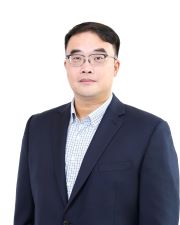
Dongjoo Choi, PhD
- Assistant Professor, IMM-Center for Neuroimmunology and Glial Biology
Biography
Dongjoo Choi, PhD, is an Assistant Professor at the Brown Foundation Institute of Molecular Medicine – Center for Neuroimmunology and Glial Biology at UTHealth Houston. Prior to joining UTHealth in 2025, he served as an Instructor at the Center for Cell and Gene Therapy and the Center for Cancer Neuroscience at Baylor College of Medicine.
Dr. Choi received his Ph.D. in South Korea under the mentorship of Prof. Eun-Hye Joe, where he uncovered key roles of the Parkinson’s disease (PD)-linked gene DJ-1 in astrocyte-mediated neuroinflammation and brain repair. His postdoctoral work in Dr. Benjamin Deneen’s lab at Baylor led to the identification of novel function of reactive astrocytes in Alzheimer’s disease (AD), the discovery of region-specific astrocyte development, and novel tumor suppressors in glioblastoma (GBM).
Dr. Choi’s research is centered on understanding the roles of disease-associated astrocytes in neurodegenerative disorders. His long-term goal is to elucidate how astrocyte-specific transcriptional programs contribute to disease onset, progression, and repair. Recent findings from his group demonstrate that AD-associated astrocytes play an active role in Aβ phagocytosis and memory preservation, offering novel insights into glial function in the context of neurodegeneration.
As an independent investigator, Dr. Choi integrates genetic mouse models, transcriptomic profiling, and glial–immune interaction analyses to address three primary research themes: the neuroprotective roles of disease-associated astrocytes, the crosstalk between astrocytes and microglia, and their combined effects on neurodegenerative disease progression. He also seeks to expand these discoveries to glioblastoma, aiming to uncover shared glial regulatory mechanisms across brain pathologies.
Education
- Postdoctoral Fellowship
- Baylor College of Medicine
- Postdoctoral Fellowship
- Ajou University School of Medicine
- PhD. -Neuroscience
- Ajou University School of Medicine
- BS - Biology
- Hanyang University
Areas of Interest
Research Interests
- Novel reactive astrocyte subpopulations and their functions in neurodegenerative diseases: Dr. Choi and his research team have a longstanding interest in dissecting the heterogeneity of reactive astrocytes in the context of neurodegenerative diseases. Their recent work focuses on identifying novel subpopulations of astrocytes that emerge in Alzheimer’s and Parkinson’s disease models, and uncovering how these subsets contribute to disease onset, progression, and neural repair. Using transcriptomic profiling and in vivo disease modeling, the lab aims to define astrocyte-specific programs that could be targeted for therapeutic intervention.
- Crosstalk between reactive astrocytes and microglia: Dr. Choi’s lab investigates the complex bidirectional communication between reactive astrocytes and microglia in diseased brain environments. By combining genetic tools, live imaging, and molecular analysis, the team is working to elucidate how astrocyte–microglia interactions influence neuroinflammation, synaptic integrity, and neuronal survival. Their goal is to reveal regulatory mechanisms within the glial network that drive or mitigate neurodegenerative progression.
- The Role of Astrocytes and Microglia in Glioblastoma Stem Cell Dynamics: Dr. Choi and his team are exploring how the glial niche, particularly astrocytes and microglia, shapes the behavior of glioma stem-like cells in glioblastoma. Their studies aim to understand how these tumor-initiating cells respond to cues from the glial microenvironment, contributing to GBM heterogeneity, treatment resistance, and recurrence. Through in vivo tumor modeling and cellular profiling, the lab seeks to identify glia-driven pathways that could serve as novel targets in glioblastoma therapy.
Publications
Selected publications in the recent five years (*Equal contribution)
- Choi DJ, Murali S, Kwon W, Woo J, Song EA, Ko Y, Sardar D, Lozzi B, Cheng Y, Williamson MR, Huang T, Sanchez K, Jankowsky J, Deneen B. Astrocytic Sox9 overexpression in Alzheimer’s disease mouse models promotes Aβ plaque phagocytosis and preserves cognitive function. Nature Neuroscience. 2025 Nov 21.
- Chen HC, He P, McDonald M, Williamson MR, Varadharajan S, Lozzi B, Woo J, Choi DJ, Sardar D, Huang-Hobbs E, Sun H, Ippagunta SM, Jain A, Rao G, Merchant TE, Ellison DW, Noebels JL, Bertrand KC, Mack SC, Deneen B. Histone serotonylation regulates ependymoma tumorigenesis. Nature. 2024 Jul 31;632:903–910.
- Kwon W*, Choi DJ*, Yu K, Williamson MR, Murali S, Ko Y, Woo J, Deneen B. Comparative Transcriptomic Analysis of Cerebellar Astrocytes across Developmental Stages and Brain Regions. Int J Mol Sci. 2024 Jan 13;25(2).
- Huang-Hobbs E, Cheng YT, Ko Y, Luna-Figueroa E, Lozzi B, Taylor KR, McDonald M, He P, Chen HC, Yang Y, Maleki E, Lee ZF, Murali S, Williamson MR, Choi D, Curry R, Bayley J, Woo J, Jalali A, Monje M, Noebels JL, Harmanci AS, Rao G, Deneen B. Remote neuronal activity drives glioma progression through SEMA4F. Nature. 2023 Jul;619(7971):844-850.
- Choi DJ, Armstrong G, Lozzi B, Vijayaraghavan P, Plon SE, Wong TC, Boerwinkle E, Muzny DM, Chen HC, Gibbs RA, Ostrom QT, Melin B, Deneen B, Bondy ML, Bainbridge MN. The genomic landscape of familial glioma. Sci Adv. 2023 Apr 28;9(17): eade2675.
- Sardar D, Cheng YT, Woo J, Choi DJ, Lee ZF, Kwon W, Chen HC, Lozzi B, Cervantes A, Rajendran K, Huang TW, Jain A, Arenkiel BR, Maze I, Deneen B. Induction of astrocytic Slc2a3 regulates sensory processing through histone serotonylation. Science. 2023 Jun 16;380(6650):eade0027.
- Choi DJ, An J, Jou I, Park SM, Joe EH. A Parkinson’s disease gene, DJ-1, regulates anti-inflammatory roles of astrocytes through prostaglandin D(2) synthase expression. Neurobiol Dis. 2019 Jul;127:482-491. (First-author and Co-corresponding author).